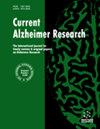Ameliorative effects of phytomedicines on Alzheimer's patients.
IF 1.8
4区 医学
Q3 CLINICAL NEUROLOGY
引用次数: 1
Abstract
INTRODUCTION Alzheimer's Disease (AD) is a progressive, neurodegenerative disease that severely affects affected individuals' cognitive abilities, memory, and quality of life. It affects the elderly population, and there is no permanent prevention or cures available today, treatments mainly aiming to alleviate the symptoms as and when they appear. Alternate therapeutic approaches are being researched constantly, and there is a growing focus on phytomedicine, herbal medicine, organic compounds, ayurvedic compounds for the treatment of AD. METHODS The current study aims to provide an extensive review of these plants against AD from the currently existing literature. Most relevant keywords like Alzheimer's Disease, phytomedicines, ethnic medicines, the role of phytomedicine in neuroprotection, common phytomedicines against AD etc., were used to select the plants and their metabolites effective in treating AD. The study focuses on six plants: Panax ginseng, Ginkgo biloba, Bacopa monnieri, Withania somnifera, Curcuma longa, and Lavandula angustifolia. Their active components have been studied alongwith, neuroprotective properties, and evidence of in-vitro, pre-clinical studies, and clinical studies conducted to prove their therapeutic potential against the disease have been presented. RESULTS All plants envisaged in the study show potential for fighting against AD to varying degrees. Their compounds have shown therapeutic effect by reversing the neurological changes such as clearing Aβ plaque and neurofibrillary tangle formation, and ameliorative effects against neurodegeneration through processes including improving concentration, memory, cognition and learning, higher working and cue memory, improved spatial memory, inhibition of NF-κB expression, inhibiting the release of pro-inflammatory cytokines, inhibition of AChE and lipid peroxidase enzymes, and reduction of interleukin levels and tumor necrosis factor-alpha. CONCLUSION The present review is a comprehensive and up-to-date analysis supported with the evidentiary profs from pre-clinical studies, meta-analyses, and review papers related to natural phytochemicals' impact on neurodegenerative disorders like AD.植物药物对阿尔茨海默病患者的改善作用。
引言阿尔茨海默病(AD)是一种进行性神经退行性疾病,严重影响患者的认知能力、记忆力和生活质量。它影响到老年人,目前还没有永久的预防或治疗方法,主要是在症状出现时缓解症状。替代治疗方法正在不断研究中,人们越来越关注用于治疗AD的植物药、草药、有机化合物、阿育吠陀化合物。本研究旨在从现有文献中对这些植物抗AD进行广泛综述。使用阿尔茨海默病、植物药物、民族药物、植物药物在神经保护中的作用、常见的抗AD植物药物等最相关的关键词来选择对治疗AD有效的植物及其代谢产物。本研究重点研究了六种植物:人参、银杏、蒙氏叶、紫薇、姜黄和狭叶薰衣草。它们的活性成分已经与神经保护特性一起进行了研究,并提出了体外、临床前研究和临床研究的证据,以证明它们对该疾病的治疗潜力。结果研究中设想的所有植物都显示出不同程度对抗AD的潜力。它们的化合物通过逆转神经系统的变化(如清除Aβ斑块和神经原纤维缠结的形成)显示出治疗效果,并通过改善注意力、记忆、认知和学习、更高的工作和线索记忆、改善空间记忆、抑制NF-κB表达等过程改善神经退行性变,抑制促炎细胞因子的释放,抑制乙酰胆碱酯酶和脂质过氧化物酶,降低白细胞介素水平和肿瘤坏死因子α,以及与天然植物化学物质对AD等神经退行性疾病的影响相关的综述论文。
本文章由计算机程序翻译,如有差异,请以英文原文为准。
求助全文
约1分钟内获得全文
求助全文
来源期刊

Current Alzheimer research
医学-神经科学
CiteScore
4.00
自引率
4.80%
发文量
64
审稿时长
4-8 weeks
期刊介绍:
Current Alzheimer Research publishes peer-reviewed frontier review, research, drug clinical trial studies and letter articles on all areas of Alzheimer’s disease. This multidisciplinary journal will help in understanding the neurobiology, genetics, pathogenesis, and treatment strategies of Alzheimer’s disease. The journal publishes objective reviews written by experts and leaders actively engaged in research using cellular, molecular, and animal models. The journal also covers original articles on recent research in fast emerging areas of molecular diagnostics, brain imaging, drug development and discovery, and clinical aspects of Alzheimer’s disease. Manuscripts are encouraged that relate to the synergistic mechanism of Alzheimer''s disease with other dementia and neurodegenerative disorders. Book reviews, meeting reports and letters-to-the-editor are also published. The journal is essential reading for researchers, educators and physicians with interest in age-related dementia and Alzheimer’s disease. Current Alzheimer Research provides a comprehensive ''bird''s-eye view'' of the current state of Alzheimer''s research for neuroscientists, clinicians, health science planners, granting, caregivers and families of this devastating disease.
 求助内容:
求助内容: 应助结果提醒方式:
应助结果提醒方式:


